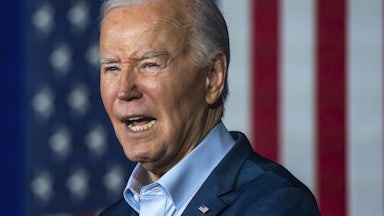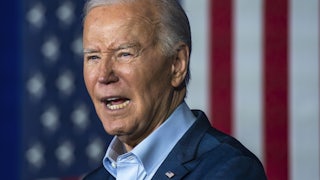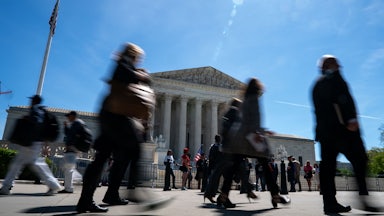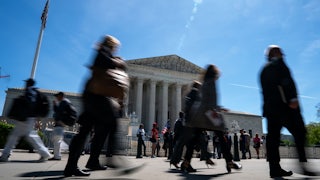The State of the Union address is something of an incantation, offering the president an annual opportunity to argue that his leadership has righted the nation’s course. Even an undertone of national malaise cannot fully forestall the relentless optimism inherent in the event. Though there have been some rare exceptions, the president nearly always testifies that state of the union is strong, regardless of how Americans may actually be feeling.
President Joe Biden’s speech on Tuesday evening was initially intended to be focused on the economy. Russia’s invasion of Ukraine scrambled those goals, putting the president on a footing that was increasingly reminiscent of the Cold War. But while the threat of war in Europe distracted from the economic message, opening the oration with a discussion of the crisis in Ukraine had the side effect of uniting an otherwise deeply divided Congress, prompting several bipartisan standing ovations.
“American resolve matters,” Biden declaimed, adding, “Putin’s latest attack on Ukraine was premeditated and unprovoked.… He thought the West and NATO wouldn’t respond. He thought he could divide us at home. Putin was wrong. We were ready.”
But American resolve has been sorely tested over the past year, thanks to a pandemic that refuses to go away completely and an economy that won’t quite blossom, in spite of some strong fundamentals. Biden had the unenviable task of addressing a nation riven by partisanship, with widespread financial hardship entwined with a seemingly booming economy. Unemployment is lower than at almost any other point in the twenty-first century, and Americans’ earnings have increased across income groups. But consumer sentiment is at its lowest point in a decade, while inflation is reaching historic highs. Oil prices are soaring in the wake of Russia’s invasion of Ukraine, and the average price of gas hit $3.62 per gallon on Tuesday, nine cents higher than it was just one week ago.
Meanwhile, Biden’s poll numbers are cratering, having never recovered from the initial dive in approval ratings in the wake of the chaotic withdrawal of U.S. troops from Afghanistan. A Quinnipiac poll published Monday found that 37 percent of Americans approve of the job Biden is doing as president. A February Gallup poll found that just 37 percent of American adults support how Biden is handling the economy. In another example of national feelings of doom and gloom, a recent USA Today-Suffolk University poll found that a 51 percent majority of those surveyed say the economy is in a recession or a depression. His approval ratings on foreign policy aren’t much higher, indicating that partisanship may diminish the rally-around-the-flag effect that typically aids a wartime president. A CBS News-YouGov poll taken after Russia invaded found that 41 percent of Americans approve of how Biden is handling the situation in Ukraine.
Americans remain deeply divided on the coronavirus according to party. A Washington Post-ABC News poll released Tuesday found that 84 percent of Democrats believe it is more important to control the spread of the virus, even if it means restricting normal activities, compared to 32 percent of Republicans. And Americans have pessimistic views on the direction the country is headed, with 70 percent of the public believing the country is going in the wrong direction, according to an Associated Press-NORC poll published Monday.
After addressing the conflict in Ukraine, Biden’s remarks were heavily focused on the economy. But the specter of the Build Back Better Act, which foundered after months of Democratic Party negotiations and infighting, hovered in the House chamber—a $2 trillion elephant in the room. Although House Democrats were able to keep it together to approve Biden’s massive public investment bill that would address climate change, health care, childcare, education, and tax policy, it never got off the ground in the Senate.
Throughout his State of the Union address, Biden touted accomplishments from the American Rescue Plan, the coronavirus relief bill that Democrats passed via reconciliation last March. “Few pieces of legislation have done more in a critical moment in our history to lift us out of crisis,” he said, to Democratic applause and stony Republican stares. “It fueled our efforts to vaccinate the nation and combat Covid-19. It delivered immediate economic relief for tens of millions of Americans.” But some of the policies that the measure implemented, such as the expanded child tax credit, would have been extended by the Build Back Better Act. Because that measure never passed, the gains the ARP afforded have begun to diminish. So Biden’s remarks touting these temporary accomplishments felt like a litany of missed opportunities. For Sale: Democratic agenda, never passed.
“I think it’s important the way he laid it out, because he really laid it out in terms that people sitting at home around their kitchen table can relate to,” Representative Dan Kildee, who represents a competitive district in Michigan, told The New Republic after the address. “Each of these individual pieces that, when put together, are branded as some big initiative aren’t as meaningful as the way he laid it out in this speech, talking about the individual elements in ways that people understand.”
Prior to the speech, congressional Democrats said that Biden needed to acknowledge and empathize with Americans’ frustrations, while still promoting his administration’s accomplishments. “He knows inflation is hurting people, and he knows the pandemic has driven them crazy, it’s driven us all crazy,” said House Majority Leader Steny Hoyer in a Tuesday call with reporters. “He’s good at understanding what regular folks are experiencing.”
Senator Tim Kaine said that he hoped Biden “first just acknowledges how tough the last two years have been.” Kaine said, “This has been a very, very difficult time and I think and hope that he will really acknowledge that in a very direct way.… Do we have challenges? Sure we do. Inflation is a challenge. Russia’s invasion of Ukraine is a challenge. But we are showing that the American economy is strong. And we’re showing that America still has a capacity to rally allies together to fight against terror in a way that no other nation in the world does. And to me, these are the signs of what I think is going to be an American comeback.”
Congressional Republicans—hardly the target audience for the address—said ahead of the speech that they believed it needed to be focused on inflation, and on the threat presented by Russia. “On foreign affairs in particular, I am sincerely rooting for President Biden’s success. We need steady, serious, and smart leadership to help guide the West through this perilous time,” Senate Minority Leader Mitch McConnell said in an otherwise scathing floor speech offering a preemptive rebuttal to Biden’s address. “But on most issues, what the American people deserve tonight is a commitment to drastically change course. If this administration does not majorly correct its course, the American people may correct course for them this November.”
“There needs to be a reorientation when something like what we’ve just seen—which is an invasion of a people by a superpower—when that occurs, it means priorities need to shift,” Senator Mitt Romney told reporters. “I don’t want to see Build Back Better in new clothing. I want to see a new set of priorities that reflect the current reality.”
Biden worked to skirt around the failure of his signature legislative agenda, touting the benefits of the successfully passed infrastructure bill, promising an “infrastructure decade” that would “put us on a path to win the economic competition of the twenty-first century that we face with the rest of the world—particularly with China.” He also promoted the benefits of the yet-to-be-passed Bipartisan Innovation Act: an equally China-minded measure, thought to have sufficient bipartisan support, which would “make record investments in emerging technologies and American manufacturing.” He also had much to say on the subject of inflation, promising a “better plan” to combat it: “Economists call it increasing the productive capacity of our economy. I call it building a better America,” he said.
Representative Ro Khanna, a strong advocate for the competitiveness bill, called Biden’s call to pass the measure “powerful.” “He linked it to jobs in Ohio, to jobs in the heartland, that this is not just abstract science and technology,” Khanna told The New Republic. Representative Cheri Bustos, who represents a district in Iowa, told The New Republic after the speech that she appreciated Biden’s appeal to rural America.
“I was glad he mentioned farmers, I was glad he mentioned rural, making it in America, bringing our supply chain home, bringing manufacturing home again—that resonates with with people I represent,” Bustos said.
In a perhaps futile exercise, the leaders of several influential House Democratic caucuses released a statement ahead of the State of the Union address urging Congress to pass Biden’s agenda through the reconciliation process, not mentioning the words “Build Back Better.”
“As Chairs of the leading House Democratic Caucuses, we are calling for Congressional action on a final negotiated reconciliation bill that secures the support of 50 U.S. Senators and 218 U.S. Representatives. We must move to reach a final agreement and focus on policies that will deliver immediate and lasting results for Americans,” wrote the leaders of the Congressional Progressive Caucus, the New Democrat Coalition, the Congressional Asian Pacific American Caucus, the Congressional Black Caucus, the Congressional Hispanic Caucus, the Democratic Women’s Caucus, the Congressional LGBTQ+ Equality Caucus, and the Sustainable Energy and Environment Coalition.
But Democrats were not unified in their response to the State of the Union. Along with the traditional Republican rebuttal, dutifully delivered this year by Iowa Governor Kim Reynolds, there was a response representing the progressive perspective from Representative Rashida Tlaib for the Working Families Party. “It’s like keying your own car and slashing your own tires,” said Representative Josh Gottheimer, a moderate Democrat, about Tlaib’s planned speech. But Gottheimer was scheduled to deliver his own response to the speech on behalf of No Labels, a centrist group, along with Republican Representative Brian Fitzpatrick. Democratic Representative Elaine Luria called the concept of Democrats giving a response to Biden’s speech “priceless,” tweeting a picture that said: “Hello my name is: Captain Oblivious.” (Representative Colin Allred delivered the response for the Congressional Black Caucus.)
In her response, Tlaib praised Biden and the Build Back Better agenda and argued that “no one fought harder for President Biden’s agenda than progressives.” “With the majority of the Build Back Better agenda stalled, Mr. President, the work is unfinished. But we are ready to jump-start our efforts again,” Tlaib said, promising that a “working families majority” in Congress would “work with President Biden to deliver for you and your family.”
The dustup over the various Democratic responses highlighted the pageantry of the evening. The State of the Union address may be little more than vaunted political theater for presidents, their allies, and their critics. Regardless of what a president actually says, the rebuttals and defenses have already been written long before the speech. This very article, in fact, was largely written before Biden’s speech.
Biden outlined four major goals that he argued should not be partisan, although they undoubtedly will be: beating the opioid epidemic, tackling mental health, supporting veterans and particularly those affected by burn pits, and defeating cancer. But despite these ostensibly milquetoast policy priorities, the negative polarization that dogged Biden’s administration remains the same as it was before he arrived at the Capitol this evening.
With the narratives and expectations set even before the State of the Union was delivered, it’s uncertain whether the president’s message can find a foothold in the American psyche and have staying power in a rapidly changing and easily distracted news cycle.
“I feel inspired and hopeful. And I think it was typical Joe Biden, that he’s trying to bring people together,” Bustos said.










